Combatting Financial Exclusion of the Elderly in the Digital Age - A Regulatory Roadmap
Research question and goal
The project is focused on addressing the growing issue of financial exclusion among the elderly, specifically in the context of rapidly advancing digitalization in financial services. As financial institutions increasingly shift their services online, the elderly, who often face challenges related to digital literacy, cognitive decline, and access to technology, are at risk of being marginalized. The project aims to explore the impact of this digital shift on older people’s ability to access financial services, such as making payments for goods and services, which is critical to their independence and well-being.
The project is responding to a clear gap in the current research landscape. Most existing studies on financial inclusion treat consumers as a homogenous group, without accounting for the specific needs of different demographics, particularly the elderly. This is problematic because the elderly face unique challenges when it comes to engaging with digital financial services. These challenges include lower levels of financial literacy, difficulties in adapting to new technologies, and cognitive impairments that increase with age. As a result, the elderly are often excluded from accessing essential financial services, which undermines their ability to live independently and participate fully in society.
The existing legal research on financial inclusion tends to focus on consumers who are already digitally engaged, neglecting those who are involuntarily excluded due to barriers like digital illiteracy or lack of access to technology. Furthermore, there is a need for a more interdisciplinary approach that combines legal, sociological, and economic perspectives to better understand the implications of digital exclusion. This project seeks to address this gap by focusing specifically on the elderly and proposing legal reforms that would ensure their inclusion in the digital financial ecosystem.
The project’s ultimate goal is to develop a regulatory roadmap that can help ensure that older adults are not left behind in this transition. This roadmap will address the legal, economic, and social aspects of digital exclusion, proposing specific regulatory frameworks that can help combat financial exclusion and promote inclusivity in the financial sector. It will assess the potential for public and private law interventions, focusing on how regulations can be designed to protect vulnerable consumers, particularly the elderly, who are less able to adapt to digital financial services.
The research builds on empirical findings that highlight the vulnerability of the elderly population to financial exclusion due to their lower levels of digital literacy, cognitive impairments, and lack of access to technology. The central research objective is to determine how legal and regulatory frameworks can be reformed or designed to ensure financial inclusion for the elderly. The project spans multiple disciplines, including law, sociology, and political economy, and involves a comparative study of the legal systems in various countries such as the U.S.A., EU member states, and the UK. This comparative approach will provide insights into the global dimensions of the issue.
Work Plan
The project is structured into five workstreams that will be carried out over a 36-month period. The first phase of the project will focus on empirical research, involving qualitative interviews with elderly citizens in various regions of Poland. These interviews will provide valuable insights into the lived experiences of elderly individuals who face barriers to accessing digital financial services. The empirical data will be collected through in-depth interviews in urban and rural areas, ensuring a broad demographic representation.
In the second phase, the project will shift to non-empirical research, analyzing the legal frameworks that govern financial services in several jurisdictions, including the U.S.A., the EU, and key member states such as Poland, France, and Germany. This legal analysis will be conducted using traditional legal scholarship methods, such as doctrinal and comparative legal studies, to identify gaps and opportunities for reform. The findings from the empirical study will be used to inform this analysis and to test the project’s central hypotheses, which relate to the necessity of a regulatory framework that can combat the financial exclusion of the elderly.
Scheduled Events Related to the Project
Several key events are planned throughout the project to facilitate the empirical and non-empirical research tasks. In Phase 1, the project team will conduct interviews with elderly individuals in four locations within two regions of Poland. These locations will include a mix of large cities, medium-sized towns, small towns, and villages to capture the diversity of experiences among the elderly population.
Additionally, the project involves multiple research stays at prominent academic institutions to allow for in-depth legal analysis and peer consultation. These stays will provide opportunities for the research team to present preliminary findings and engage with leading experts in the field.
Project Publications
The project is expected to produce a significant number of high-profile academic publications that will contribute to both legal and interdisciplinary scholarship.
- Anne-Marie Weber, Weronika Herbet-Homenda, Helena Kordasiewicz, Unveiling Digital Exclusion Among the Elderly: Gaps in Knowledge and Methodology, [in:] D. Damar-Blanken, M. Kelly-Louw (eds.), Financial Inclusion Law and Over-Indebtedness, Routledge 2025, pp. 27-44.
Conferences
Throughout the project, the research team will present their findings at various academic conferences to ensure wide dissemination and peer feedback. Additionally, the research will be presented at least at five significant conferences in Poland to engage with the national academic and policymaking community. The findings will also be shared through workshops and roundtable discussions hosted by leading academic institutions, providing further opportunities for peer consultation and collaboration.
- 1st European Conference of the International Association of Consumer Law (IACL), supported by Girton College, University of Cambridge, 16-17.09.2024.
Within the panel “Over-Inclusion, Under-Protection and Targeting – Responses to Discrimination, Inequality and Exclusion in Financial Services’ Weronika Herbet-Homenda presented the paper “Consumer Vulnerability in Financial Markets: Special Protection of the Elderly”, co-authored with Anne-Marie Weber. Both the presentation and the subsequent discussion revolved around the challenges linked to particular vulnerabilities of senior consumers in the financial markets and various risks encompassed therein, as well as information obligations as an exemplary remedy that could be useful in counteracting market exclusion.
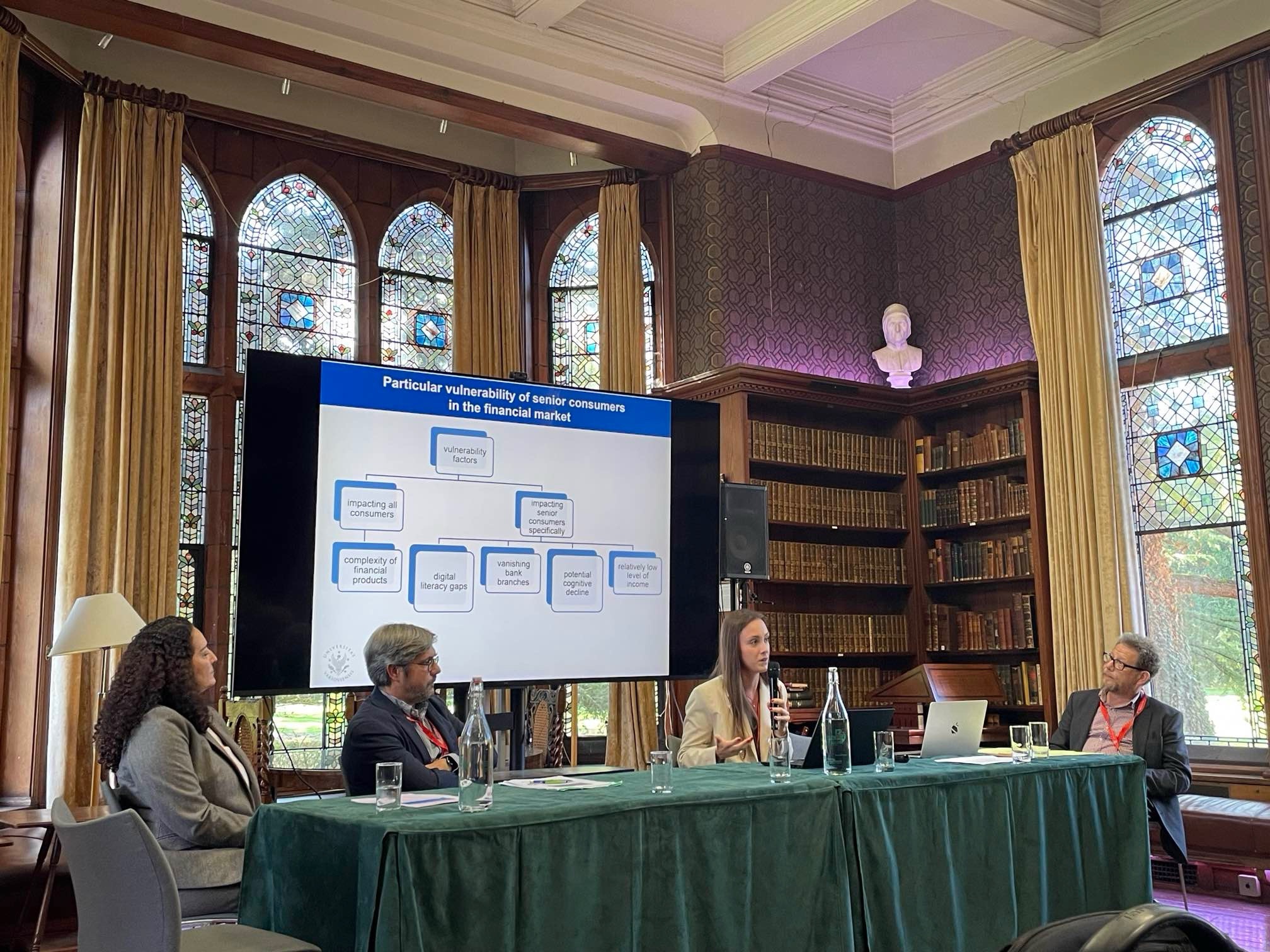
- 3rd Max Planck Law Group hosted in Berlin, October 8, 2024
On 8th October 2024, dr Anne-Marie Weber and Weronika Herbet-Homenda presented a paper “Equal access to the financial markets in the digital age: contextualizing the vulnerability of senior consumers” at the 3rd Max Planck European Law Group hosted in Berlin.
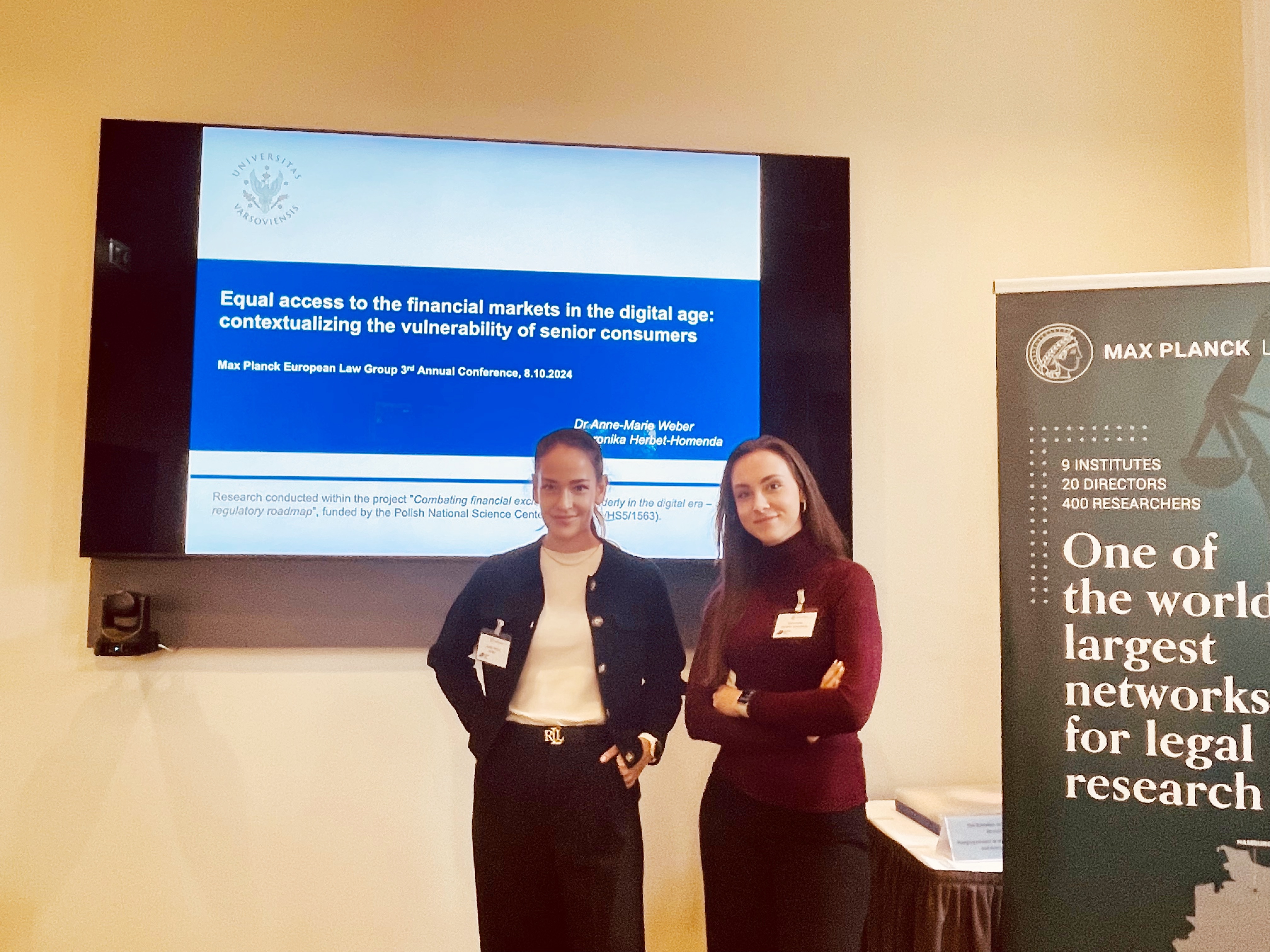
- II International Conference on Business Law, April 4, 2025.
As part of the student-doctoral panel “Sustainability,” Hanna Salera presented a paper entitled: “Leave No-One Behind: Fostering Financial Inclusion of the Elderly in Light of the SDGs.” The presentation analyzed the challenges of financial exclusion of the elderly and the need to address them in sustainable development policies, in line with Agenda 2030 and the Sustainable Development Goals (SDGs). The presentation, as well as the accompanying discussion, addressed, among other things, the role of financial institutions in countering exclusion, mechanisms to support inclusiveness, and the need to adapt financial services to the specific needs of seniors.
-
IX International Scientific Conference “Protection and Security in the Financial Market, May 22, 2025
On 22nd May 2025, PhD Anne-Marie Weber presented a paper titled “Covering financial institutions with public policy on financial education - a gap in the National Financial Education Strategy for Poland?” during the 9th International Scientific Conference “Protection and Security in the Financial Market”, hosted at the University of Lodz in cooperation with the Wroclaw University of Economics and Business.Her presentation was part of Session I and addressed a critical policy gap concerning the inclusion of financial institutions in Poland’s public strategy on financial education. Her analysis focused on the need for coordinated regulatory efforts to improve institutional involvement in building financial literacy and consumer protection.
The conference gathered experts from over a dozen countries, offering parallel sessions in both Polish and English. Topics ranged from fraud prevention and AI in financial services to sustainable finance, ESG policy, and the role of central banks.
-
II International Scientific Conference “Finance and New Technologies – Legal and Economic Aspects”, May 23, 2025
On 23rd May 2025, Weronika Herbet-Homenda delivered a presentation titled “Risk of financial exclusion of the elderly in the digital age and the protection of vulnerable consumers” during the 2nd International Scientific Conference “Finance and New Technologies – Legal and Economic Aspects”, held in a hybrid format in Opole, Poland.Her speach formed part of Panel III: New Technologies in Banking. The presentation addressed the growing risk of financial exclusion faced by elderly consumers in the era of digital transformation and explored the legal mechanisms available to protect vulnerable clients in the financial services market.
The conference gathered experts from academic and professional circles across Europe, offering a platform for discussion on the intersection of finance, law, and emerging technologies. Weronika Herbet-Homenda's contribution highlighted the importance of inclusive policy and regulatory approaches amid rapid digitization of the banking sector.
-
2025 Global Forum for Financial Consumers (GFFC), August 22–23, 2025, Sungkyunkwan University, Seoul, Republic of Korea.
Dr Anne-Marie Weber presented a paper entitled: “Bridging or Widening the Digital Divide? The Digital Euro and Financial Inclusivity.”
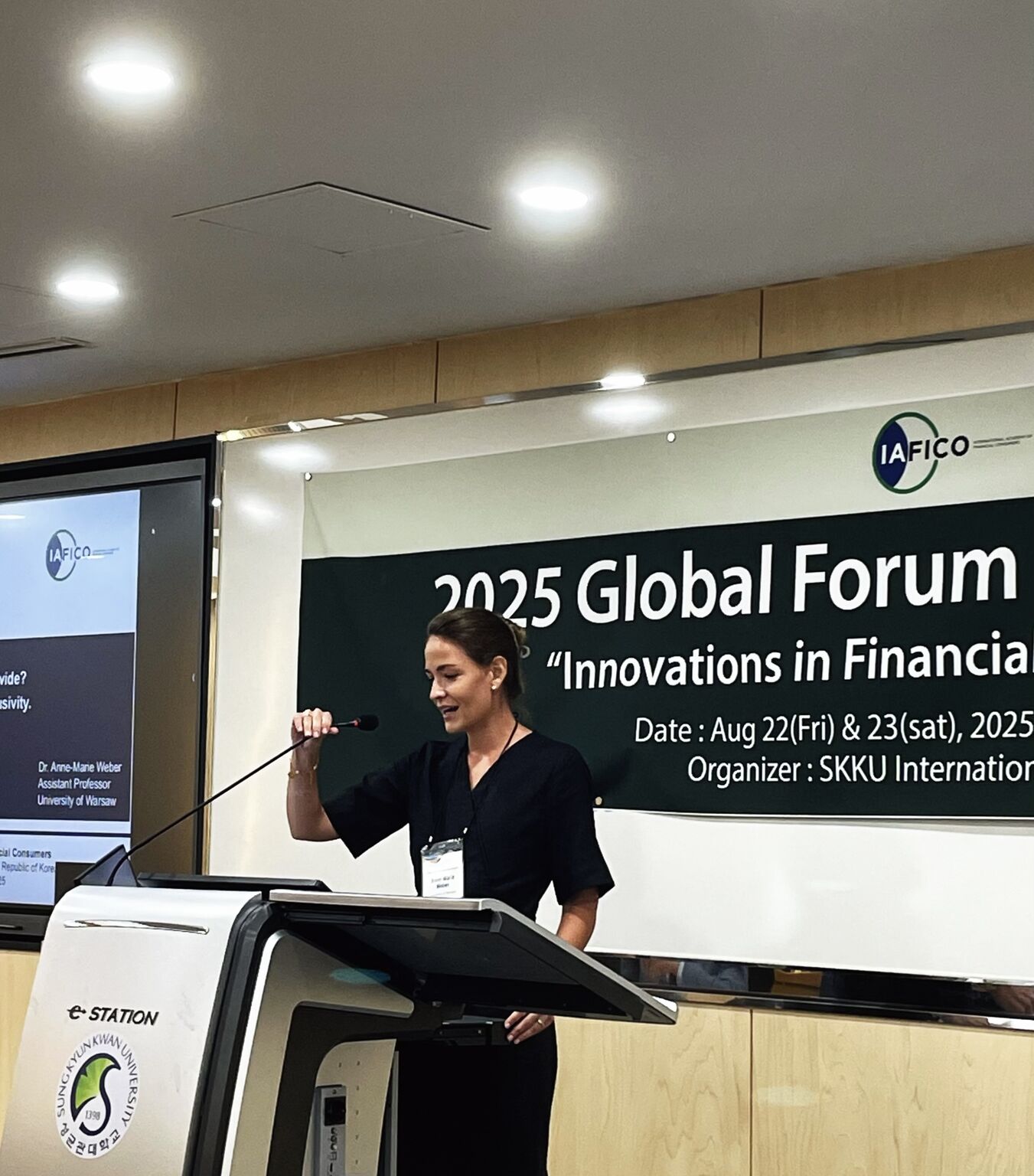
Project Team

Anne-Marie Weber
Anne-Marie Weber holds the position of Assistant Professor at the Chair of Commercial Law of the University of Warsaw, where she has defended her doctoral thesis, which was then awarded by the Chairman of the Polish Financial Supervision Authority in the competition for the best doctoral thesis in the field of the financial market and published as a monograph entitled ‘Wpływ instytucji prawnych rynku kapitałowego na efektywność spółek Skarbu Państwa’ (‘The influence of capital market institutions on state-controlled companies’ efficiency’). She is a graduate of Master's studies (LL.M.) at the Berkeley School of Law. She teaches company law and financial market law and is a lecturer at the School of German Law operating at the Faculty of Law and Administration of the University of Warsaw. Dr. Anne-Marie Weber is a frequent Visiting Scholar of the Max Planck Institute for Comparative and International Private Law in Hamburg. She also was a Visiting Professor at the Berkeley School of Law and the University of Mainz. She has been awarded with several scholarships and research grants, amongst others, by the French Government (Campus France), the Max Planck Gesellschaft and the Polish National Science Center. Her habilitation thesis, which is currently in preparation, concerns the issue of implementing and enforcing climate policy goals by means of private law institutions, primarily company law.

Robert Rybski
Robert Rybski holds the position of Assistant Professor at the Faculty of Law and Administration of the University of Warsaw, where he also serves as Director of the "Sustainable Finance – Postgraduate Studies in Law and Finance" program and Supervisor of the Environmental Protection Law Student Research Association. He defended his doctoral thesis in 2018, devoted to nuclear energy in Germany at the intersection of German constitutional law, energy law, and environmental protection. He is a graduate of law at the University of Warsaw, an LL.M. at Humboldt-Universität zu Berlin, the Sustainable Finance Executive Programme at the University of Oxford, and the International School in Nuclear Law at the University of Montpellier. Dr. Rybski teaches sustainable finance, constitutional law, and new technologies. With a background in civil society, he has worked at the Office of the Polish Ombudsman for Citizens’ Rights, Ludwig Boltzmann Institute of Human Rights, ClientEarth Poland Foundation, and Helsinki Foundation for Human Rights. For 9 years he served as an Expert in the Infrastructure and Exchange Trading Department of the Polish Financial Supervision Authority (KNF), where he also served as Poland’s National Delegated Expert in the EU’s Commodity Derivatives Task Force (CDTF) under the European Securities and Markets Authority (ESMA), as well as in International Organization of Securities Commissions' 7th Committee on Derivatives.

Paweł Maranowski
Paweł Maranowski is a sociologist, lecturer at Civitas University, Chief Expert for Research and Analysis at the Educational Research Institute – National Research Institute, and a member of a team conducting the national PISA 2025 study in Poland. Serving from 2019 to 2025 as Vice-Rector for Student Affairs at Collegium Civitas, since this year he has been affiliated with the Faculty of Law and Administration at the University of Warsaw, where, as a research methodology expert, he has been a member of research teams carrying out the “International Sanctions Evasion through Central Bank Digital Currencies” and “Combatting Financial Exclusion of the Elderly in the Digital Age – A Regulatory Roadmap” projects. His academic interests focus on political sociology, sociology of law, political psychology, and especially social research methodology, survey research, and both quantitative and qualitative data analysis. Selected publications: Elita sądownictwa w III RP na początku procesu przemiany i destabilizacji (The Judicial Elite in the Third Polish Republic at the Beginning of the Process of Transformation and Destabilization), 2022; Worldview Polarization of Polish Society and Social Classes and Strata (with A. Przestalski and P. Ruszkowski), 2020; Społeczne światy rządowej elity administracyjnej (Social Worlds of the Governmental Administrative Elite), 2016; Rola innowacji społecznych w polskich uczelniach (The Role of Social Innovations in Polish Universities), 2016; Elity administracyjne państwa w procesach stanowienia prawa (State Administrative Elites in Law-Making Processes), 2015.
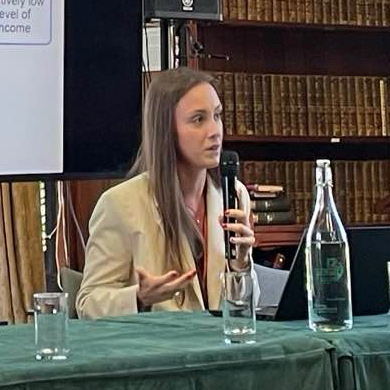
Weronika Herbet-Homenda
Weronika Herbet-Homenda is a PhD candidate at the Department of Commercial Law, Faculty of Law and Administration, University of Warsaw; associate at BWHS Wojciechowski Springer i Wspólnicy sp.k. She specializes in competition, consumer protection and company law, focusing her research on issues located on the borderline of these areas, including antitrust liability within groups of companies and consumer protection in the digital markets.
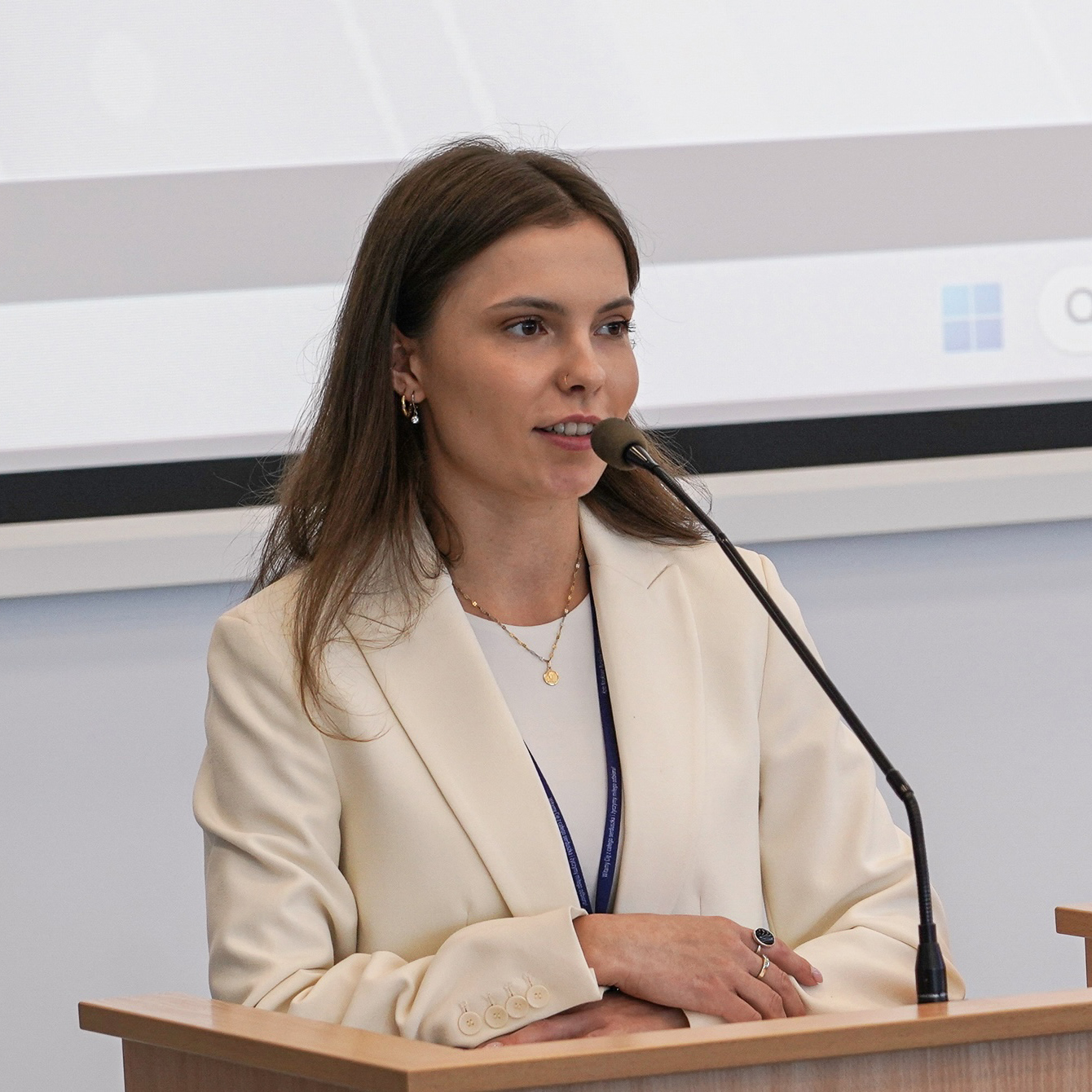
Hanna Salera
Hanna Salera is a third-year law student at the University of Opole, where she also graduated with a Bachelor's degree in Business Service. Actively involved in academic activities, she serves as President of the Students' Research Club devoted to Financial Markets. She is currently working as a Legal Assistant at GP Legal & Partners Kancelaria Radców Prawnych, where she is gaining practical experience in the field of law. Her main areas of interest include capital markets law, medical law and business law.

Tymoteusz O’Neill
Tymoteusz O’Neill is a recent law graduate from the University of Warsaw. From January to May 2025, he served as the United Nations Representative of the International Federation for Family Development in New York. During this period, he developed an interest in older persons’ rights and chose to focus his master’s thesis on the protection of older persons’ rights in international law. He also served as President of the Colloquium Legale Science Club and has published articles in the areas of antitrust and agricultural law. His interests include human rights, constitutional law, and administrative law.



